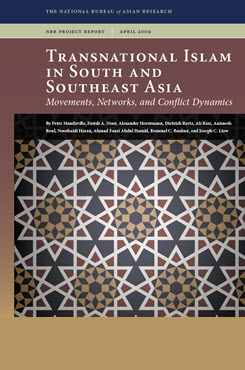From Transnational Islam in South and Southeast Asia: Movements, Networks, and Conflict Dynamics
Transnational Islam in the Philippines
This essay describes significant state and non-state conduits of transnational Islam in the Philippines and examines how they have influenced the contemporary conflict dynamics of the country.
EXECUTIVE SUMMARY
This paper describes significant state and non-state conduits of transnational Islam in the Philippines and examines how they have influenced the contemporary conflict dynamics of the country. The paper pays particular attention to the Moro resistance movement in the southern Philippines, observing that the Moros have legitimate grievances as a result of discrimination and the dispossession of their ancestral domains. The paper argues that transnational Islamic propagation activities have heightened the Islamic consciousness of Philippine Muslims, largely encouraging their struggle for self-determination.
MAIN FINDINGS
Though Spain established a dominant Christian community in the major parts of the Philippine archipelago (1565-1898), many Muslim communities in Mindanao remained unconquered. Although political integration programs during U.S. rule of the Philippines (1901-1935) were implemented, including the establishment of a Moro Province, Philippine Muslims were seen as a minority. The long-term result of this minority status among the Moros was a sense of marginality and, ultimately, rejection of the Philippine nation-state. The confluence of transnational Islamic trends following Philippine independence deepened Moro Islamic consciousness while strengthening Moro nationalist sentiment. Transnational Islamic ideas and support inspired Muslim groups in the Philippines to continue their struggle against the Christian-dominated Philippine government. Leaders who resented the oppression of Muslims in the country have established armed resistant groups like the Moro National Liberation Front (MNLF), the Moro Islamic Liberation Front (MILF) and the Abu Sayyaf Group (ASG). Other resistant groups and personalities, however, remain unarmed, preferring the path of peaceful change. However, these “peaceful” groups have a complex relationship with the armed groups that confounds the conflict dynamics between Muslims and Christians in the country. Both state-affiliated and non-state transnational Islamic players also complicate the situation by introducing fundamentalist and extremist ideologies that encourage the Moros in their struggle. Among the transnational Islamic groups active in the Philippines, the Tabligh Jamaat has the largest following. The Tabligh Jamaat is often accused of serving as a cover for Muslim extremists to propagate militancy in the country. The Southeast Asian regional terrorist organization, Jemaah Islamiyah, poses the greatest threat to the security of the Philippines.
POLICY IMPLICATIONS
- The Philippine government lacks a coherent and nuanced understanding of transnational Islam, as it tends to simply equate transnational Islam with terrorism.
- Unless the Philippine government can win the hearts and minds of the Moros through effective governance and a nuanced strategy, the conflict in Mindanao will likely continue. This conflict could possibly spillover into Malaysia, while facilitating the movement of transnational militants between these two countries.


